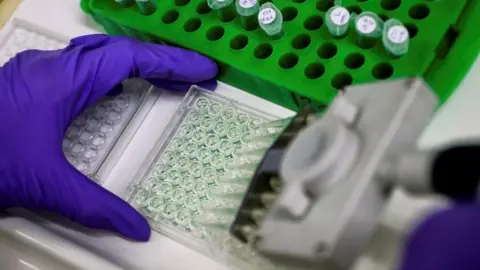Close research links with EU 'negotiable' post-Brexit
 LEWIS HOUGHTON/SCIENCE PHOTO LIBRARY
LEWIS HOUGHTON/SCIENCE PHOTO LIBRARYThe government is prepared to negotiate continued membership of the European Union's research funding bodies after exiting the EU, the BBC understands.
A range of options for scientific collaboration will be set out in a government paper on Wednesday.
The paper will show that the UK "values" the research community's work, Brexit Secretary David Davis said.
The news has been welcomed by the scientific community as a positive first step.
Mr Davis said both he and the prime minister understood the importance of the UK's research relationship with the EU.
"This paper sends a clear message to the research and innovation community that we value their work and we feel it is crucial that we maintain collaboration with our European partners after we exit," he said.
Science minister Jo Johnson said the UK's research relationship with the EU was to our "mutual benefit".
British science is one of the biggest winners of membership of the European Union.
Between 2007 and 2013, the UK received £8bn from the EU - £3bn more than it put into the research budget.
More money, less say?
Its membership of the main European research programme, Horizon 2020, also enables UK researchers and businesses to develop collaborations with leading European labs and partners.
Any new arrangement is unlikely to be as beneficial. The UK is likely to have to pay more to be involved in the programme and have less say in how the money is spent.
Horizon 2020 does allow associate membership for non-EU countries. These include Switzerland, Norway and Israel. Arrangements for participation are made on a case-by-case basis.
Associate members are able to apply for funding but not be involved in discussions that determine research priorities.
If the UK were to lose its voice in such discussions, priorities may well be skewed toward the remaining nations' strengths, to the disadvantage of British research proposals.
 Reuters
ReutersDr Sarah Main, of the campaign for Science and Engineering, said: "It's positive to see the government making science a priority in the negotiations and trying to maintain the collaborative research links with the EU that UK scientists find so valuable.
"What is interesting is that this is probably the first government paper to suggest a softer approach to maintaining mutually beneficial arrangements beyond Brexit.
"This is possible in the domain of science and innovation because of the high regard in which UK science is held and the strong networks of research across Europe."
'Attract brightest and best'
The President of the Royal Society, Prof Venkatraman Ramakrishanan, told BBC News it was a good first step for the government in safeguarding the UK's leading position in research.
But he said this commitment needed to turn into specific actions, such as "a financial commitment to Horizon 2020 until its end and guarantees about the status of the highly skilled EU researchers already working here".
Prof Ramkrishanan added that barriers to the free movement of scientists from EU countries would be an impediment to collaboration.
"We have to ensure we have an immigration system that can attract the brightest and best minds to the UK, and a regulatory system that promotes seamless collaboration".
Follow Pallab on Twitter
